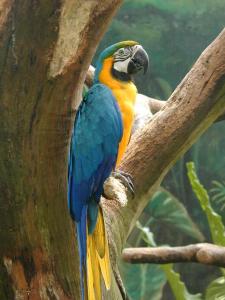|
| 질의: Parrots in captivity | 결과: 17번째/37 | |
Blue-and-yellow Macaw (Ara ararauna) - Wiki
| 제목: | Blue-and-yellow Macaw (Ara ararauna) - Wiki
| |

| 해상도: 225x300
파일크기: 13510 Bytes
등록시간: 2007:01:29 15:20:44
|
Blue-and-yellow Macaw
From Wikipedia, the free encyclopedia
[Photo] http://jpatokal.iki.fi/photo/travel/Singapore/BirdPark/Macaw_BlueYellow.JPG
The Blue-and-yellow Macaw (Ara ararauna), also known as Blue-and-gold Macaw, is a member of the macaw group of parrots which breeds in the swampy forests of tropical South America from Panama south to Brazil, Bolivia and Paraguay. It is probably now extinct on Trinidad.
They can reach 76-86 cm long and weigh 900 to 1300 g and are vivid in appearance with blue wings and tail, golden (some might say, "butterscotch") underparts and a green cap on the head. Their beaks are jet black and very strong for crushing nuts.
In captivity
Although popular as pets because of their striking appearance and ability to talk, the price of a single bird may be in excess of US $1,000-$2,000 in North America, and their large size makes domestication difficult.
They require much more effort and knowledge from owners than more traditional pets such as dogs or cats. They are intelligent and loving, so for someone who can provide for their needs, they make good companion animals.
Even the most well cared for Blue-and-Gold Macaw will "scream" and make other loud noises, nonetheless, it is possible to make them silent. Loud vocalizations and destructive chewing are natural parts of their behavior and should be expected in captivity. To some extent you can redirect chewing to toys, but a macaw left alone, uncaged in a room will likely redecorate. By providing a number of toys in cage, one can minimize the destructive chewing as the bird will focus chewing on those appropriate objects.
They require a varied diet, a seed only diet will lead to health problems such as vitamin deficiency. An example of a good diet would be a quality pelleted mix, in conjunction with a mix featuring seed, nuts, and dried fruits, with fresh vegetables and fruits fed regularly; furthermore, it is quite common (and appreciated by the parrot) to partake with their human owners of safe foods like pasta, bread, etc. It is important to avoid foods with high fat content (generally) while striving to provide a wide variety of foods.
There are some foods which are toxic to birds and parrots as a group. Cherry pits, avocados, chocolate, and caffeine are some foods that should not be fed. Chocolate and caffeine are not metabolized by birds the same way they are in humans.
http://en.wikipedia.org/wiki/Blue-and-yellow_Macaw
| The text in this page is based on the copyrighted Wikipedia article shown in above URL. It is used under the GNU Free Documentation License. You may redistribute it, verbatim or modified, providing that you comply with the terms of the GFDL. |
|

|

|

|
Parrots in captivity
17/37 |

|

|
^o^
동물그림창고 똑똑전화 누리집
^o^
|
|